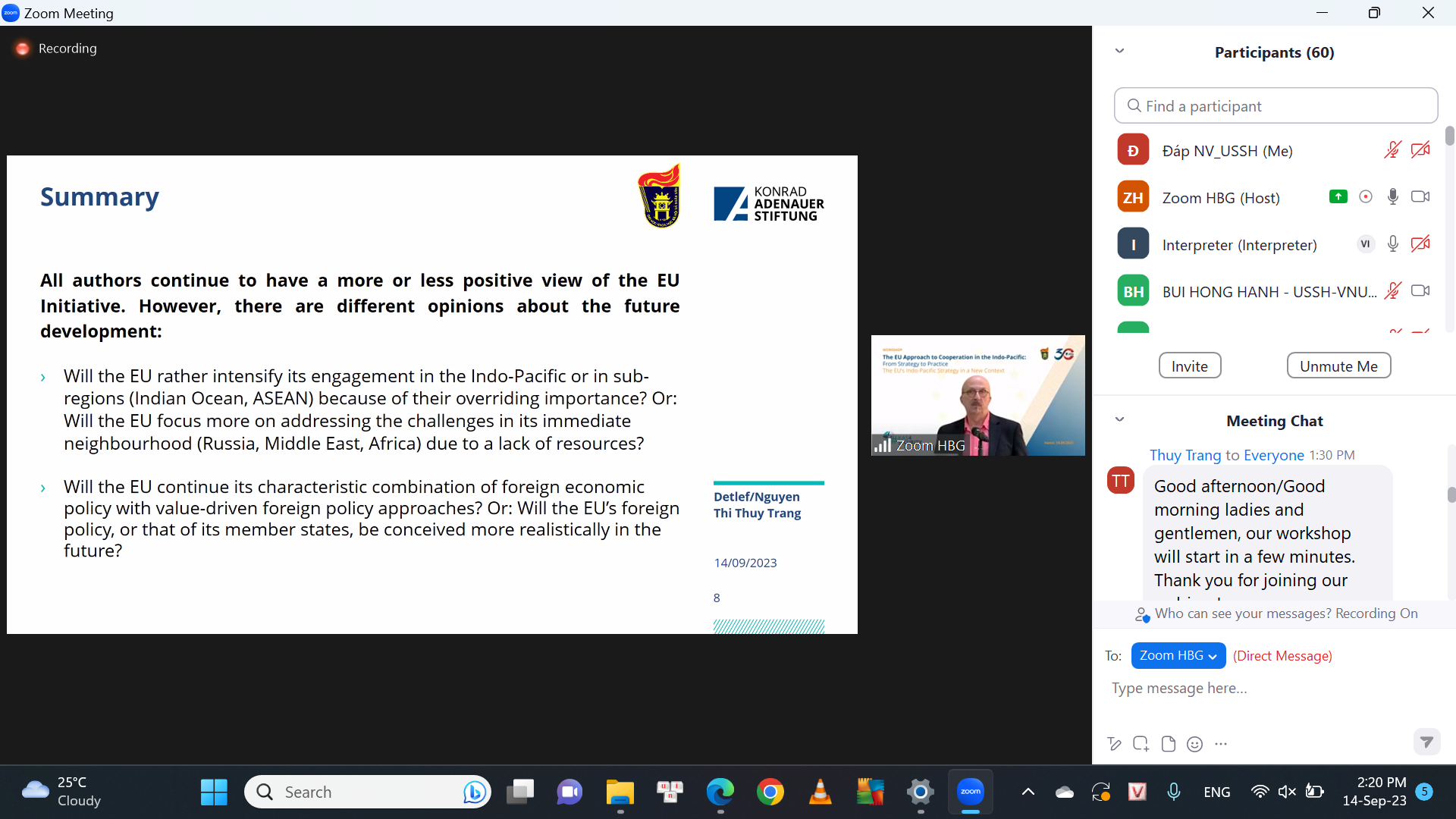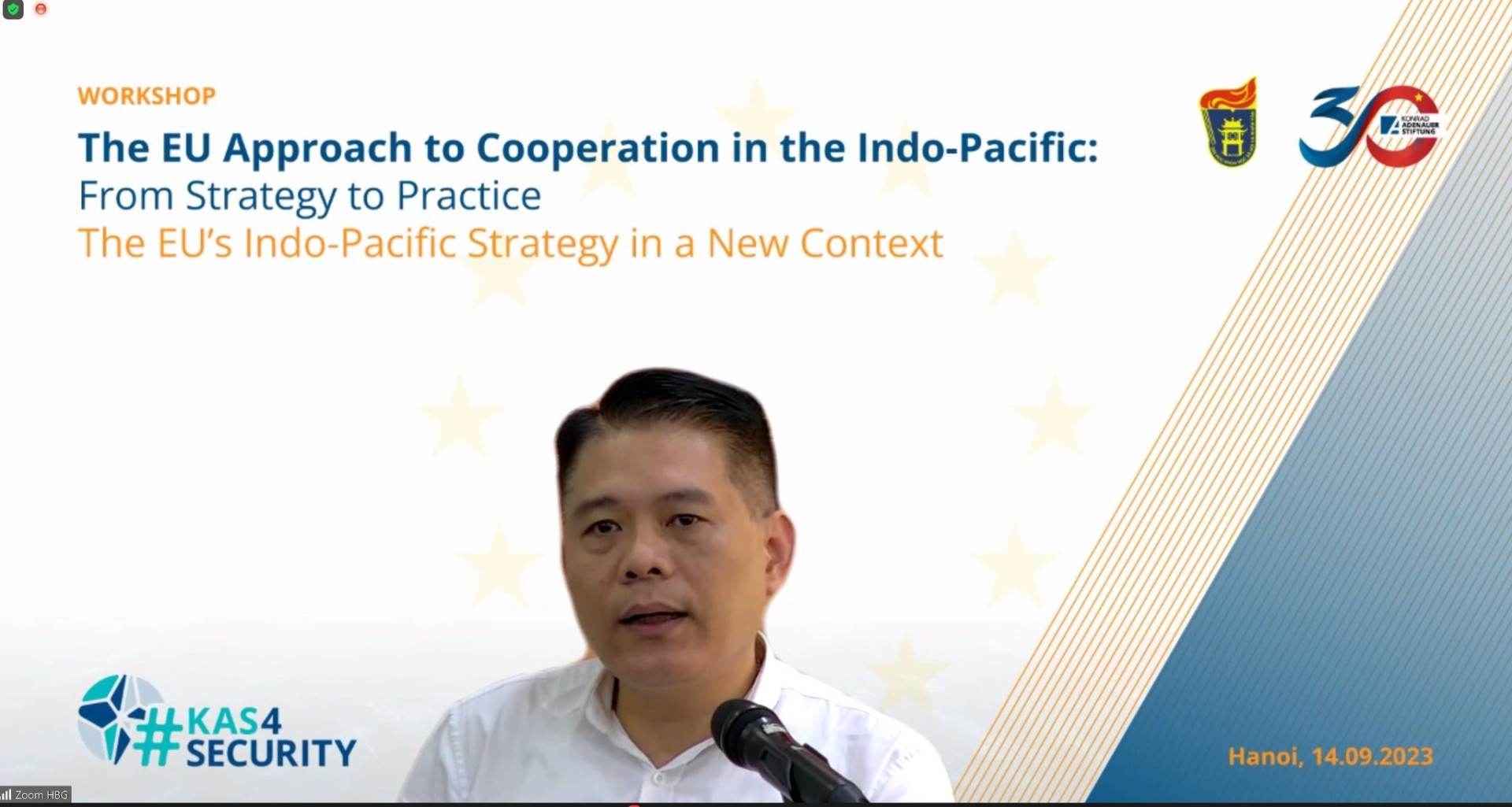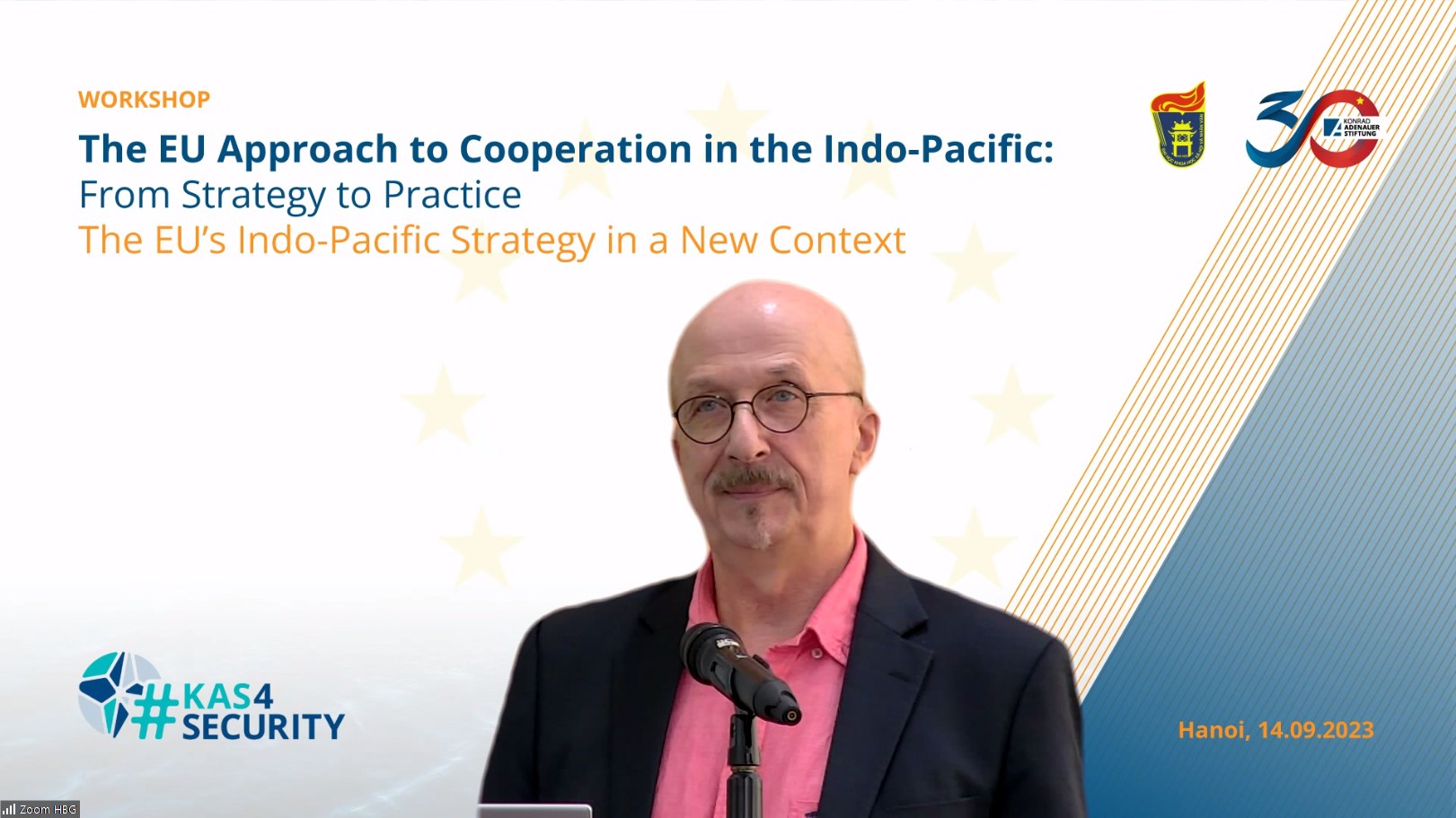The workshop was held online to discuss and evaluate the implementation of the European Union (EU) Indo-Pacific Strategy since its official launch in September 2021. On that basis, the workshop also aimed to evaluate the prospects for the implementation of this EU strategy in the coming time.
The workshop was attended by Associate Professor, Dr. Bui Thanh Nam, Deputy Secretary of the Party Committee of the University of Social Sciences and Humanities, Mr. Florian Feyerabend, Chief Representative of the Konrad-Adenauer-Stiftung in Vietnam; the leadership of the Faculty of International Studies, experts as well as a large number of lecturers and students from many training and research institutions on International Studies/International Relations across the country.
In his welcoming speech at the conference, Associate Professor, Dr. Bui Thanh Nam emphasized the significance of the conference as well as highly appreciated the cooperation between the Konrad Adenauer Stiftung in Vietnam and the University: “The vision and strong support of KAS are the foundation that makes this academic cooperation not only feasible but also promising. The event organized by our two units today continues to demonstrate this effective and sustainable relationship.”
Highly appreciating the cooperative relationship between the two sides, Associate Professor, Dr. Tran Thien Thanh, Head of the Faculty of International Studies, also expressed his wish to further promote the proactive and positive contributions of the Faculty of International Studies in the cooperation between the two sides in the future.
At the beginning of the discussion, Dr. Detlef Briesen from Justus-Liebig University Giessen (Germany) – a key member of the research team – presented a summary of the main research results of the third phase of the project. Specifically, the reports pointed to a strong movement towards a new multipolar world order and the European Union needs a strategy to increase its global influence (Dr. Detlef).
In that context, the EU needs to develop its own policy orientation based on strategic autonomy and prioritize establishing a crucial balance in its engagement with the Indo-Pacific region (Prof. Margit Bussmann, Griefswald University, Germany).
Regarding specific areas of bilateral relations between the EU and countries in the Indo-Pacific region, the reports focused on a number of topics: the EU's focused connectivity strategy with the region to achieve maximum efficiency (Assoc. Prof. Dr. Bui Hong Hanh, School of Social Sciences and Humanities, VNU), the potentials and strengths in the EU's economic cooperation with the region (Dr. Nguyen Van Dap, School of Social Sciences and Humanities, VNU) and the complexity of the EU's value-focused approach when engaging in regional issues (Dr. Nguyen Thi Thuy Trang and Dr. Nguyen Thi My Hanh, School of Social Sciences and Humanities, VNU).
In addition to commenting on the main research results shared by the research team representatives, the workshop also expanded the discussion on the views of important regional actors on the implementation of the EU strategy in the new context. Professor Go Ito, Meiji University (Japan) said that the Indo-Pacific region is a complex security area and Japan can play an important role, while the EU's engagement in the region is only effective when it can resolve differences between member states to implement a common policy. Commenting on the views of Korea, Dr. Nguyen Thi Thu Huong, University of Social Sciences and Humanities, VNU, said that “The EU’s Indo-Pacific Strategy is an opportunity for Korea to seek new international partners, in addition to traditional partners such as the US and Asian countries. Based on the foundation of previously established relationships, Korea will certainly aim to strengthen its current relationship with the EU but will have to face new challenges, from considering relations with partners to ensuring national security and economic development.” Prof. Dr. Kumaresan Raja, Pondicherry University, India, commenting on India’s perspective, said: “India’s approach to the Indo-Pacific focuses on ASEAN centrality. This approach complements the EU’s approach to the region, which aims to maintain political and social stability, the EU’s primary focus being Asia. The EU also supports measures that support the region’s high economic growth. The interests of India and the EU converge as both sides agree to build a partnership to strengthen the rules-based global order.”

Concluding the workshop, Mr. Florian Feyerabend, Chief Representative of the Konrad-Adenauer-Stiftung in Vietnam, once again affirmed: “The Indo-Pacific has become the geopolitical center of attraction of the 21st century. This is a region geographically distant from the European Union but is an important region for both the prosperity and security of the European Union. The European Union's strategy recognizes the geostrategic and geopolitical importance of the Indo-Pacific in general and Southeast Asia in particular.”
| The research project "The European Union's approach to cooperation in the Indo-Pacific region: From strategy to practice" is implemented by the University of Social Sciences and Humanities (Vietnam National University, Hanoi) in collaboration with the Konrad Adenauer Stiftung (Germany) in Vietnam, including three phases: The first phase in 2021 analyzes the EU's Strategy and some members' views on cooperation in the Indo-Pacific region and Vietnam's initial views; Phase 2 in 2022 examines the views and reactions of important countries in the Indo-Pacific region to the EU's Strategy; Phase 3 in 2023 studies the impact of changes in the international situation on the implementation of the EU's Strategy and the future prospects of EU cooperation in the region./. |


